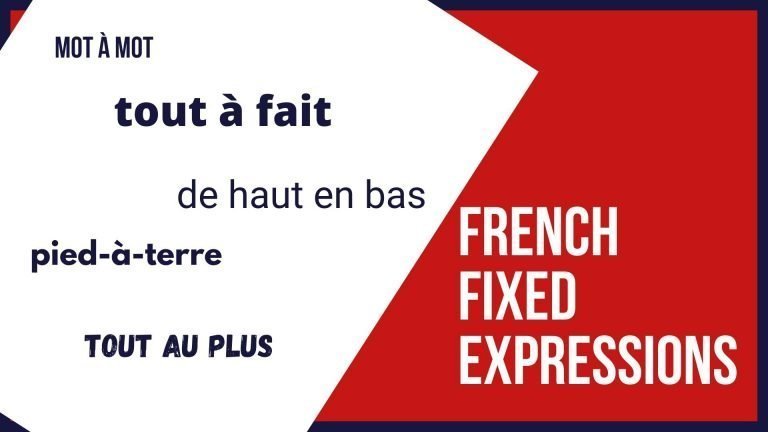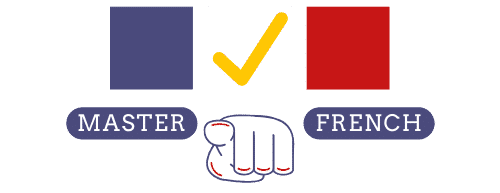French set phrases for everyday use and how to pronounce them
Published on 8 October, 2022 by Mylene in French Expressions ▪

In this article I invite you to discover the pronunciation of the main set phrases for everyday use:
What are set phrases in French?
Set phrases in French are expressions with a group of words that has a meaning. In these expressions, you can’t separate the words or add another word without changing the meaning. As the words are linked, it is very often necessary to make a liaison between the expression’s words. Set phrases are sometimes referred to as fixed expressions and phraseme.
Why is it important to learn set phrases in French?
Learning expressions is important because they can help you sound more fluent and native-like when speaking French. French expressions can also add personality and flair to your language, making it more interesting for both you and your listener. If you want to be understood by your listener, it is important to master pronunciation when speaking French. This is because if you mispronounce a set phrase, your listener might not be able to understand you. Therefore, it is important to start learning expressions and focus on mastering pronunciation.
Set phrases with the sound [z]
De temps en temps
De temps‿en temps: from time to time.
Example: Je vais à l’épicerie de temps en temps. I go to the grocery store once in a while.
De plus en plus
De plus‿en plus: More and more.
Example: Il y a de plus en plus de soleil. There is more and more sun.
Just like the phrase “de plus en plus”, the word plus is pronounced with a “z” sound in various situations. Explore the different pronunciations of the word plus and learn when to pronounce plus with an “s” sound, when to pronounce it with a “z” sound, and when the letter ‘s’ is muted.
De mieux en mieux
De mieux‿en mieux: Better and better.
Example: On communique de mieux en mieux. We communicate better and better.
De temps à autre
De temps‿à autre: From time to time.
Example: De temps à autre j’oublie mes clés à la maison. From time to time I forget my keys at home.
Set phrases with the sound [t]
Avant-hier
Avant-‿hier: The day before yesterday.
Example: Avant-hier j’ai rencontré le voisin. The day before yesterday I met the neighbor.
D’un bout à l’autre
D’un bout‿à l’autre: from strat to finish.
Example: Le film était bien d’un bout à l’autre. The movie was good from start to finish.
De haut en bas
De haut‿en bas: up and down.
Example: Il m’a regardé de haut en bas. He looked me up and down.
Tout à fait
Tout‿à fait: absolutely.
Example: Tu as tout à fait raison. You are absolutely right.
Tout au plus
Tout‿au plus: at most.
Example: Dix personnes sont arrivées tout au plus. Ten people arrived at most.
Un accent aigu
Un accent‿aigu: accute accent.
Example: N’oubliez pas l’accent aigu. Don’t forget the acute accent.
Petit à petit
Petit‿à petit: little by little.
Example: Il faut s’adapter petit à petit. You have to adapt little by little.
Nuit et jour
Nuit‿et jour: all the time.
Example: Yves travaille nuit et jour. Yves works night and day.
Mot à mot
Mot‿à mot: word by word.
Example: Les enfant suivent les consignes mot à mot. The children follow the instructions word by word.
Pot-au-feu
Pot-‿au-feu: le pot-au-feu est une recette traditionnelle.
Example: Le pot-au-feu est un plat traditionnel de la cuisine française. Pot-au-feu is a traditional dish of French cuisine.
Un pied-à-terre
Un pied-‿à-terre: un pied à terre est un logement où on séjourne occasionnellement.
Example: C’est le moment pour s’offrir un pied-à-terre en Provence. Now is the time to acquire an accomodation in Provence.
Overcoming the Pronunciation Barrier
To begin, listen to the correct pronunciation of some set phrases and fixed expressions in French thanks to this video. These expressions contain several words that cannot be separated otherwise the meaning is different. I pronounce 14 expressions that contain required liaisons in French.
This video is very educational but to overcome all your French pronunciation difficulties book a study session to receive personalized advice.



It’s been wonderful.
Merci boucou
Hello! Thank you for the comment. A très bientôt!